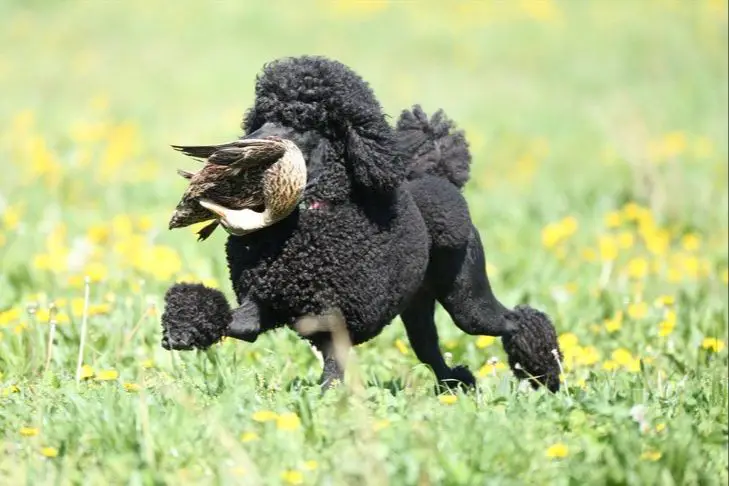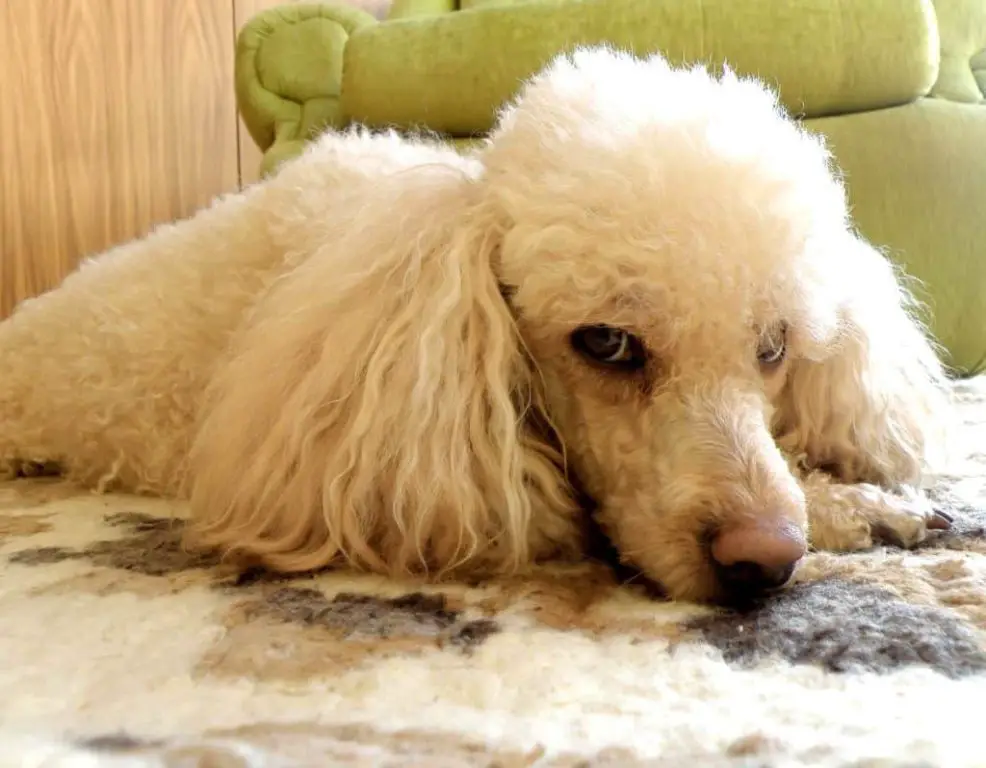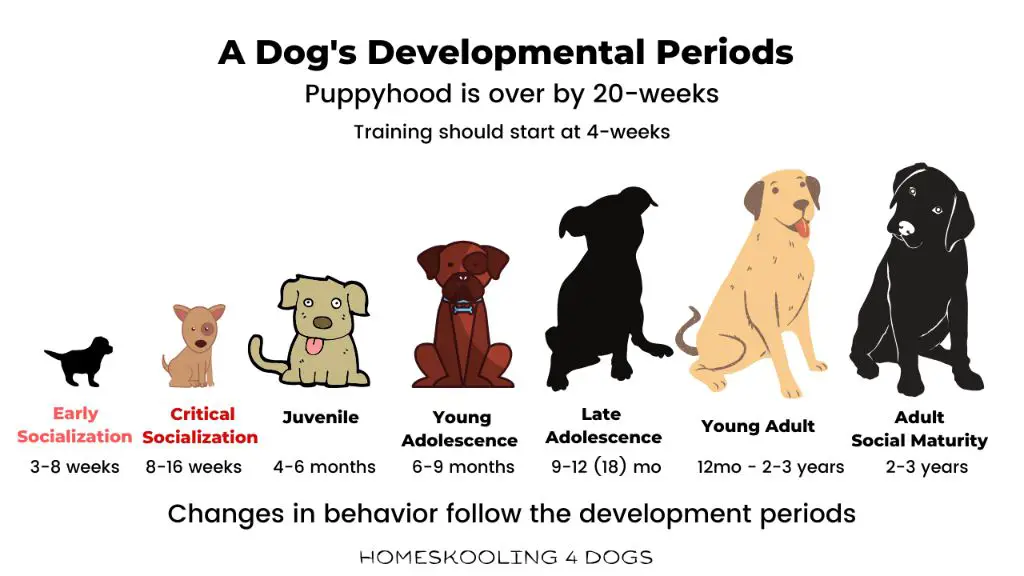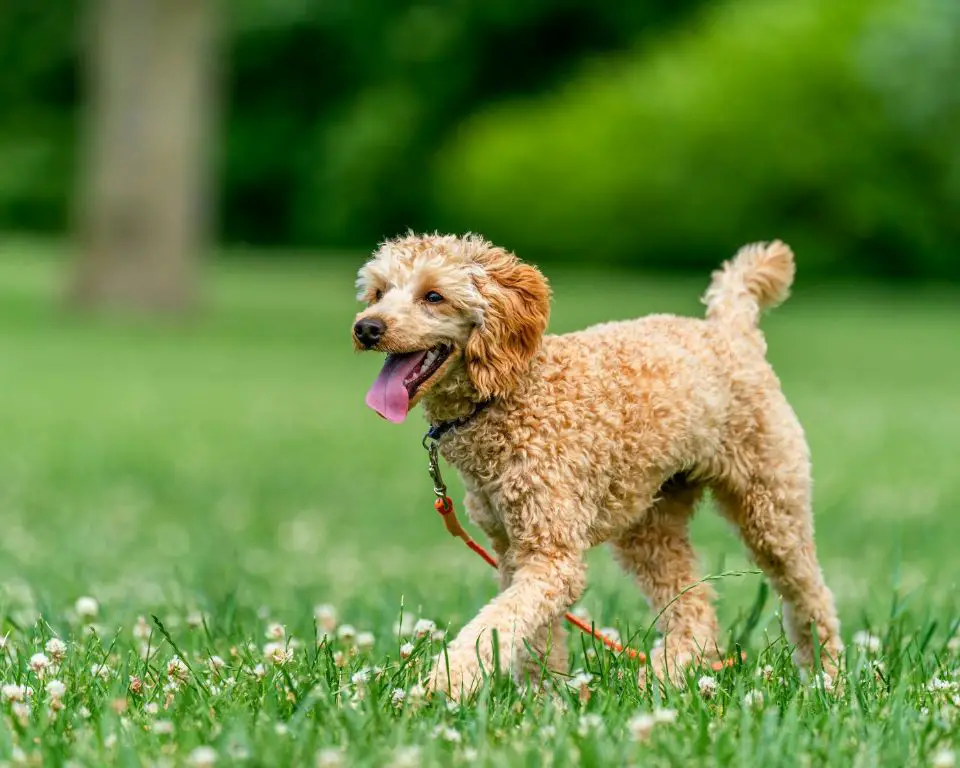Introduction
Poodles are known for having a reputation as anxious dogs. There are a few reasons why poodles tend to be more prone to anxiety than some breeds:
Breed History
Poodles originated as hunting and working dogs. The breed likely developed in Germany where they were used as water retrievers. Their name comes from the German word “pudel” meaning “to splash in water”. Poodles became popular hunting dogs because of their intelligence, trainability, and low-shedding curly coats that protected them in cold water (Gun Dog Magazine).
For centuries in Europe, the standard poodle was known as an excellent retriever and hunter of waterfowl, capable in the field and on the water. The poodle’s keen intelligence and trainability made it well-suited for hunting tasks. Its distinctive curly coat served as protection from cold water when retrieving waterfowl. Poodles worked as gundogs alongside hunters, locating game and retrieving downed birds (Gun Dog).

Grooming
Poodles are known for their show-stopping, high-maintenance coats that require extensive grooming on a regular basis. This can be very time-consuming and potentially stressful for poodles who are prone to anxiety.
Poodles need to be groomed every 4-8 weeks to maintain their distinctive haircuts. Their curly coats easily become matted and tangled without proper care. Frequent brushing and combing is essential, which can be challenging for anxious poodles who dislike handling and restraint 1. Introducing grooming tools and routines gradually and using positive reinforcement helps anxious poodles feel more comfortable.
Being handled and restrained by groomers can also create anxiety for poodles. It’s important to find an experienced groomer who is patient, gentle, and able to work with nervous dogs. Some accommodations like grooming at home or prescription sedatives may help extremely anxious poodles tolerate the grooming process.
While grooming is unavoidable for poodles, thoughtful introduction of grooming and finding an appropriate groomer can help minimize anxiety surrounding this intensive process.
Intelligence
Poodles are well known for being a highly intelligent and active breed according to Poodle Intelligence. This intelligence applies to toy, miniature, and standard poodles. Their active minds allow them to learn commands and tricks quickly. However, their intelligence can also make them prone to anxiety and behavior problems if they become bored or understimulated. While poodles are eager to please and highly trainable, owners need to provide plenty of mental stimulation through training sessions, interactive toys, and socialization experiences.
According to the American Kennel Club, poodles rank as the 2nd most intelligent dog breed behind only the border collie per Why Poodles Experience Stress and Anxiety. Their intelligence is comparable to a 2-2.5 year old child. Poodles excel at agility, obedience training, and other canine sports that engage their active minds and energetic spirits.
Separation Anxiety
Poodles are prone to separation anxiety and can become very distressed when left alone. A 2019 study published in Dog Behavior found that separation anxiety is quite common in miniature and toy poodles (Cannizzo, 2019). The study surveyed poodle owners and found that over 50% of poodles showed signs of separation distress like barking, howling, destruction, and toileting when left alone.

Other studies have also found high rates of separation anxiety in poodles:
- A 2023 survey by Certapet found that 70% of poodle owners reported their dogs having separation anxiety. Poodles were among the top breeds prone to the condition (Certapet, 2023).
- A 2023 DVM360 survey found over 50% of poodle owners said their dogs appeared sad, followed them, or tried to stop them from leaving (DVM360, 2023).
The poodle’s high intelligence, strong bonding to their owners, and energetic nature likely contribute to separation issues. Proper training, socialization, exercise, and creating a positive association with alone time can help prevent separation anxiety in poodles.
Socialization
Socialization is critical for poodles to prevent anxiety and undesirable behaviors. Poodles that are not properly socialized from a young age are more likely to be timid, anxious, or even protective around strangers and in unfamiliar environments according to this source. Socialization involves exposing poodles to a wide variety of sights, sounds, people, animals, and experiences in a positive and controlled way during the critical development periods. Well-socialized poodles are more confident, less reactive, and better equipped to handle change and novel situations. Proper socialization techniques like positive reinforcement training, supervised interactions, and socialization classes can help prevent anxiety in poodles later in life. It teaches them that new things are not scary and helps build their confidence. Starting socialization early and continuing it consistently is key to raising a poodle that is well-adjusted and comfortable in any environment.

Training
Poodles are highly intelligent dogs that excel in obedience training. Proper training is crucial for poodles as it provides mental stimulation, builds confidence, and prevents problem behaviors like anxiety or destruction. According to Pet Care Rx, “Without daily training and attention, Poodles may become restless and anxious.”
Obedience training is especially beneficial for poodles. It establishes you as the pack leader which provides security and direction for the poodle. Training reinforces commands and rules which gives the dog structure. It also tires the poodle mentally through concentration and problem solving. Furthermore, the bonding during training creates a strong relationship between owner and dog.
Pet Care Rx states, “Make training sessions fun and rewarding. Poodles thrive on praise and attention.” Reward-based training with treats and positive reinforcement is ideal. Being smart dogs, poodles need variation to stay challenged and engaged. Training should start early and remain consistent. Well-trained poodles that get mental stimulation are less likely to develop anxious or destructive behaviors.
Exercise
Poodles are energetic dogs that require daily exercise to prevent anxiety and other behavior issues. The amount of exercise a poodle needs depends on the size of the dog.
Standard poodles should get 60-90 minutes of brisk walking or running per day. Miniature poodles need 30-60 minutes, while toy poodles only require 20-40 minutes. High-intensity activities like swimming, hiking, agility training, and playing fetch are great ways to exercise a poodle’s body and mind.

According to the article “Why Poodles Experience Stress and Anxiety” on CalmingDog.com, “Taking your dog for a stroll or a jog is a great way to help it work off some of its energy to avoid anxious or destructive behavior.”
Without adequate daily exercise, poodles are prone to developing separation anxiety, hyperactivity, and other undesirable behaviors. Regular activity helps poodles release pent-up energy, stimulates them mentally, and prevents boredom. Tired poodles are less likely to be anxious or high-strung.
Other Factors
A poodle’s anxiety levels can also be influenced by factors related to their owner and environment. According to https://iheartdogs.com/7-sure-fire-ways-to-calm-your-poodles-anxiety/, anxious owners often have anxious dogs. If an owner gets stressed easily, the poodle may pick up on that energy. It’s important for owners to remain calm, consistent, and optimistic when interacting with their poodle.
Environmental factors like a chaotic household, frequent moving/traveling, or lack of routine can also exacerbate a poodle’s anxiety according to https://www.akc.org/expert-advice/health/treating-dog-anxiety/. Poodles tend to do best in a stable environment with minimal disruptions. Creating a predictable daily routine and minimizing sudden environmental changes can help keep poodles relaxed.
Conclusion
In summary, poodles are intelligent dogs that can be prone to separation anxiety and high-strung behavior. Their breeding as working dogs makes them energetic, and they require ample exercise and mental stimulation. Poodles thrive when properly socialized and trained. While sensitive, they are eager to please and respond well to positive reinforcement training. Their signature haircuts come with extensive grooming requirements that not all owners can meet. With their active nature and need for attention, poodles may not be ideal pets for frequently absent owners. However, with plenty of activity, socialization and an attentive family, poodles can make lively and entertaining companions.
